A large group of alt-right sites, low quality publishers, and other websites are mislabeling Ads.Txt publisher relationships and potentially committing a form of advertising fraud.
Summary: The Interactive Advertising Bureau’s ads.txt standard is being abused by publishers mislabeling and sharing a “DIRECT” label for account-bidding IDs used in online bidding protocols — with the DIRECT labels being spread out across sometimes hundreds of unrelated websites. This inventory mislabeling creates online advertising Dark Pool Sales Houses, a market behavior that likely violates consumer protection frameworks, and in the future, securities laws should be expanded to explicitly address the purposeful mislabeling of online advertising inventory.
TABLE OF CONTENTS
- Introduction to Overlapping DIRECT IDs in an Ads.txt Record — Breitbart.com & RT.com
- The origins of ads.txt
- Ads.txt was supposed to reduce online advertising fraud
- Ads.txt uses certification bodies to check sales houses — but they don’t work
- Ads.txt was adopted slowly, until Google started pushing it
- Breitbart is aggressively mislabeling DIRECT inventory, pooling money and data into Dark Pool Sales Houses
- Advertisers can’t tell if they’ve been funding Breitbart
- Breitbart doesn’t label their Dark Pool Sales Houses — but RT.com does!
- Many companies are helping publishers create Dark Pool Sales Houses…or looking the other way as it happens…
- Here are 34 websites that share DIRECT ID’s with Breitbart
- Dark Pool Sales Houses need more scrutiny from the advertising industry and regulatory oversight
- Conclusion & Next Steps
- Online Advertising Brand Problems Require Businesses to “Check Your Ads” — and Why Co-Founders Nandini Jammi and Claire Atkin Understand Brand Risk in the Online Ads Space in the Era of Fake News, Disinformation, and Hate Speech
This research is being published in collaboration with Nandini Jammi and Claire Atkin, co-founders of Check My Ads (https://www.checkmyads.org/) and publishers of the must-subscribe newsletter BRANDED. Click here to view their summary and details.
Introduction to Overlapping DIRECT IDs in an Ads.txt Record — Breitbart.com & RT.com
If you compare the Breitbart.com/ads.txt file against the RT.com/ads.txt file, you will find at least 4 identical account-bidding IDs that share the “DIRECT” label on both sites, which is mislabeled RESELLER inventory being sold as DIRECT inventory to advertising buyers.
These account-bidding IDs are also known as “SellerIDs” “AccountIDs” or “BiddingIDs” — several industry terms relate to this same ID found in the ads.txt file.
Any shared DIRECT account-bidding IDs across uniquely owned websites creates a Dark Pool Sales House that spreads money and data across all the websites participating in the architecture.
The account-bidding IDs found in the ads.txt records for RT.com and Breitbart.com that both say “DIRECT” and are otherwise identical, are:
pubmatic.com, 154037, DIRECT, 5d62403b186f2ace (Dark Pool Sales House across ~208 websites)
appnexus.com, 8233, DIRECT, f5ab79cb980f11d1 (Dark Pool Sales House across ~101 websites)
appnexus.com, 9393, DIRECT, f5ab79cb980f11d1 (Dark Pool Sales House across ~194 websites)
indexexchange.com, 186684, DIRECT, 50b1c356f2c5c8fc (Dark Pool Sales House across ~10 unique websites) — This is an extremely small Dark Pool Sales House, mostly just RT.com and Breitbart.com — the other sites are small)
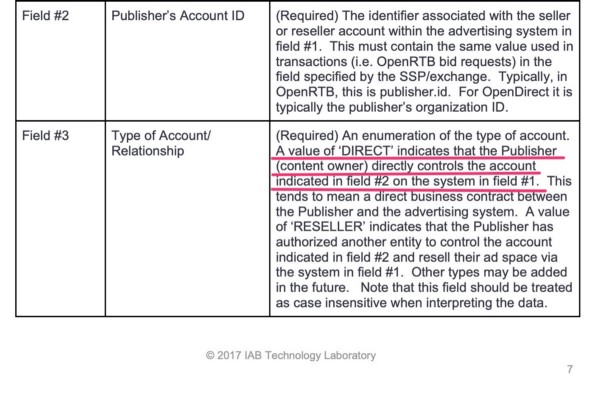
The origins of ads.txt
The IAB Tech Lab has established the specifications for ads.txt.
Their ads.txt standards state that a value of “DIRECT” indicates “that the Publisher (content owner) directly controls the account indicated in field #2 on the system in field #1.”
The “RESELLER” field is also clearly defined as indicating “that the Publisher has authorized another entity to control the account indicated in field #2 and resell their ad space via the system in field #1.”
While these standards are only 3 years old, currently in 2020, these standards are being abused, with the DIRECT label being applied to RESELLER inventories across numerous unscrupulous websites, a potentially fraudulent practice.
Breitbart.com is among numerous websites abusing the global ads.txt standards created by the Interactive Advertising Bureau (IAB), and due to their efforts to clone account-bidding IDs across domains, while mislabeling the “DIRECT” relationship field that is supposed to differentiate between a “RESELLER” inventory and the directly-controlled “DIRECT” inventory, online advertising buyers who have purchased ads on hundreds, if not thousands of websites have been quietly allowing their data and money to pool into Dark Pool Sales Houses that fund the fake news, disinformation and hate speech that is published on Breitbart News and similar publications, including RT.com.
Many of the websites deploying this Direct-Inventory-Mislabeling will be familiar names in conservative circles, including: Breitbart, Drudge Report, the Daily Caller, PJ Media, Fox9, and more, but many other organizations also have overlapping Direct-mislabeled inventory with Breitbart, including Vimeo.com, MSN.com, Upworthy.com, TalkingPointsMemo.com, NBA.com, Adweek.com, and other publishers and organizations that may not have realized that they are working with Breitbart to build a global online advertising mislabeling ring.
This process to create Dark Pool Sales Houses has historically been done through opaque SSP arbitraging, which many buyers hoped would end with the deployment of ads.txt. From Digiday in 2017, before ads.txt:
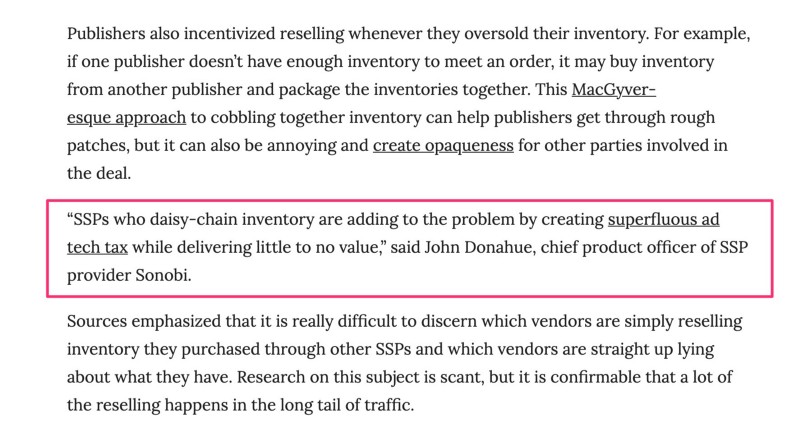
Ads.txt was supposed to reduce online advertising fraud
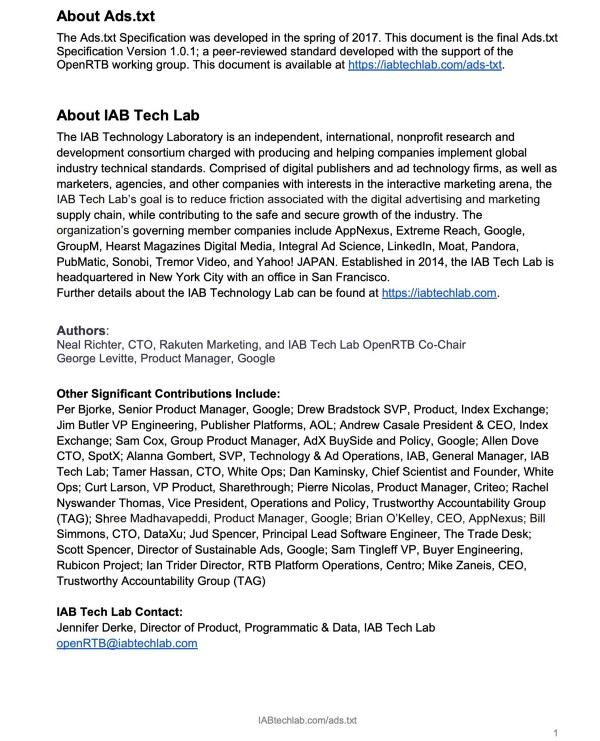
Ads.txt is a relatively new online advertising standard created in the Spring of 2017 by the Interactive Advertising Bureau (IAB), with the first versions of the ads.txt standard being released in November 2017 and then eventually finalized in the Spring of 2019.
The authors and contributors to the ads.txt standard are mostly well-known technologists leading large companies working in the online advertising space. A huge portion of the organizations who worked on the original standards have been letting their own clients abuse the bid labeling requirements, which is creating whole new layers of unscrupulous and deceptive advertising practices, and CPM clearing houses that couldn’t and didn’t exist before the ads.txt standards were deployed.
Ads.txt was meant to “clean up the online advertising industry.” It has done the opposite. The vast majority of advertising companies who have deployed any types of domain block lists for their clients have not also deployed tools to effectively find these new types of ads.txt Dark Pool Sales Houses and block those mislabeled DIRECT account-bidding IDs from their inventories.
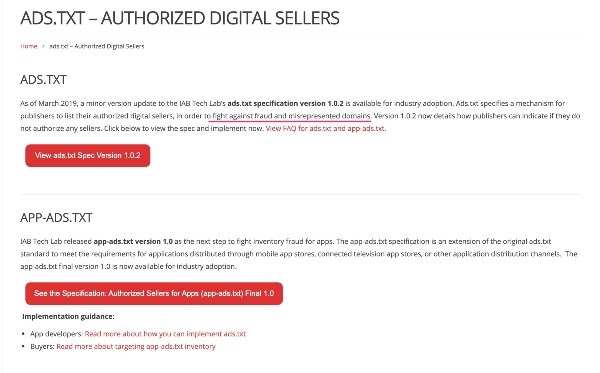
Currently, ads.txt has been endorsed and deployed by all the major online advertising exchanges. The IAB has a helpful list that includes dozens of the largest advertising exchanges and their ads.txt mappings, but this list does not reflect even a tiny portion of the actual “advertising exchanges” (many of which are Dark Pool Sales Houses) that show up in publisher ads.txt files across the internet.
Prior to this standard, account-bidding IDs needed to be parsed through header bidding files, post-auction pixel/cookie syncs, and through other server-side methods working directly with ad exchanges. But now, anyone participating in online advertising on a domain needs to deploy a file located at domain.com/ads.txt with a consistent format, which is ingested and parsed to help online advertising buyers target their ads effectively, and help them avoid specific types of Reseller inventories that are typically lower quality than Direct inventory.
It’s always been common knowledge that advertising Dark Pool Sales Houses exist. The IAB mentioned that sales houses were used in Japan during ads.txt publisher discussions. That’s why the “RESELLER” label was created. Pubmatic, too, includes a mention of Sales Houses on their ads.txt implementation page:
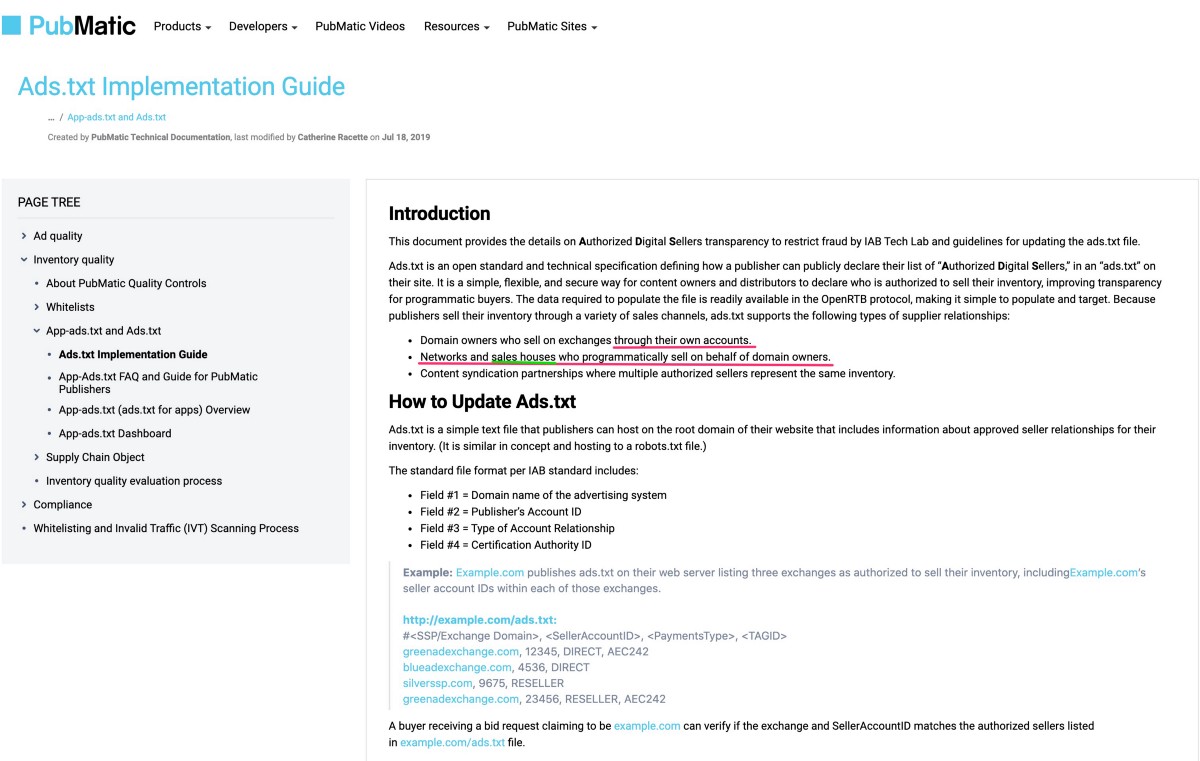
Ads.txt uses certification bodies to check sales houses — but they don’t seem to be working
In every ads.txt record, there is a note mentioning a “certification authority.” This is typically (always?) from the “Trustworthy Accountability Group” (TAG) who were amongst the original authors of the ads.txt standards. Unfortunately, a huge portion of the mislabeled “DIRECT” account-bidding IDs found on Breitbart.com also have TAG-IDs, which is an indication that TAG has no transparency into Dark Pool Sales Houses, or isn’t banning them.
A TAG certification apparently doesn’t prevent their clients from deploying these mislabeled DIRECT IDs across hundreds of unrelated domains.

Here’s the “Google Ad Manager Training” video titled “DoubleClick: Create an ads.txt File.”
In this video, Google specifically mentions the DIRECT label being used to indicate that the publisher directly controls the account , with their narrator saying:
“…the third required field is the type of account or relationship. Use the value ‘DIRECT’ to indicate that the publisher directly controls the account indicated in field #2 on the system in field #1. This tends to mean a direct business contract between the publisher and the advertising system. Use the value ‘RESELLER’ to indicate that the publisher has authorized another entity to control the account indicated in field #2 and resell their ad space via the system in field #1.”
Google has always advised clients to properly identify DIRECT vs RESELLER inventory, but it’s unclear if they are stopping or policing this practice.
It’s also unclear if Google’s “Bid time invalid traffic protection” is blocking bids from account-bidding IDs labeled as “DIRECT” when they are used in Dark Pool Sales Houses, but most public indications point to this not currently happening.
From Google’s ads.txt blog post:
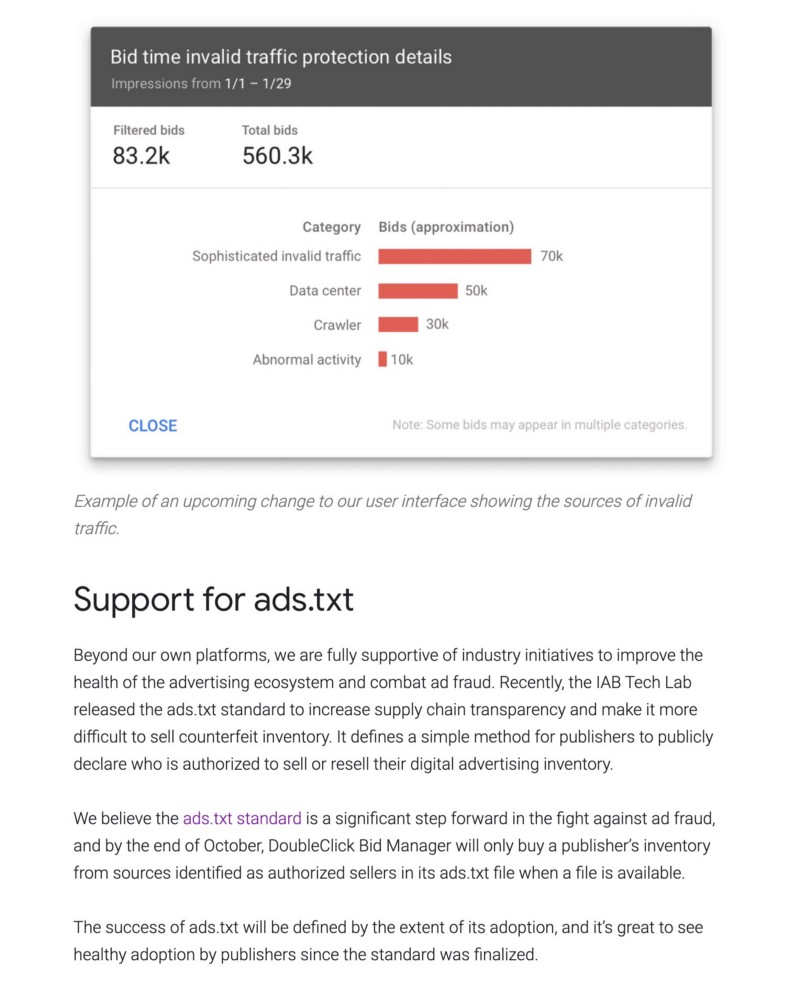
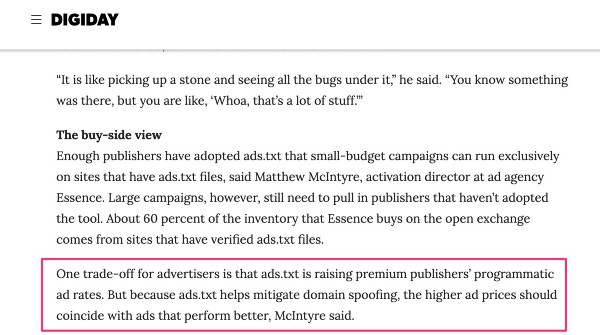
Ads.txt was adopted slowly, until Google started pushing it
In 2017, adoption was slow until Google started to aggressively endorse the ads.txt protocols and notifying publishers they would restrict bids for websites that didn’t use the new standards.
Digiday wrote “Before Google announced it would use ads.txt files to filter unauthorized inventory, just 20 percent of the publishers that work with ad tech firm Advelvet had ads.txt files, said Murat Deligoz, CEO of Advelvet, which helps publishers set price floors in Google’s ad exchange. Now, all the publishers that work directly with Deligoz’s company have ads.txt files. ‘Google is definitely the force to get ads.txt up and running,’ he said.”
In 2017, AdOpsInsider’s Ben Kneen highlighted why the DIRECT label was going to be preferred for advertising buyers, writing, “Buyers will most likely prefer direct supply paths to reseller paths, as there is one less company in the value chain and fees are therefore likely lower through direct paths.”
As ads.txt was deployed, in 2018 articles started to be written about how the deployment of ads.txt was increasing CPM rates for premium publishers. Few articles after this have parsed the ways ads.txt could be abused, or why it’s crucial for publishers to not share DIRECT labels with other businesses, without crossing an important line into mislabeling their own inventory.
The “RESELLER” label was created for a reason, but without anyone paying attention, the global advertising supply chain now has a mislabeled supply of DIRECT account-bidding IDs that online advertising buyers are being forced to navigate without the tools to avoid this inventory.
Breitbart is aggressively mislabeling DIRECT inventory, pooling money and data into Dark Pool Sales Houses
During this research, which lasted from early June 2020 through July 15th, 2020, the Breitbart.com/ads.txt file has not seen any changes (or at least the tool being used to track these changes hasn’t flagged any).
During this period, there were a total of 1,112 total ads.txt records, with 233 of the account-bidding IDs used in online advertising bidding having the “DIRECT” label and 879 having the “RESELLER” label.
In reality, it seems that only 16 of these DIRECT labeled account-bidding IDs are actually directly controlled by Breitbart, and without being cloned on additional websites.
Another way to put this, 1,096 of the total 1,112 account-bidding IDs in the Breitbart ads.txt record are either Resellers and/or part of a cross-domain Dark Pool Sales House.
Breitbart currently mislabels their inventory via the DIRECT/RESELLER account-bidding IDs— and the site claims 20.95% of the advertising inventory as DIRECT, when in reality only 1.44% of their inventory is DIRECT, with the difference being due to Dark Pool Sales Houses sharing DIRECT labels across businesses and collaborating on the money and user data that flows through those shared account-bidding ID.
Another way to put this: 98.56% of the inventory on Breitbart.com is either RESELLER inventory or Dark Pool Sales House cross-business inventory mislabeled as DIRECT.
Advertisers can’t tell if they’ve been funding Breitbart
If you are NOT trying to show ads on Breitbart, or share your money and data with Breitbart’s Dark Pool Sales House partners, this means that there are literally hundreds, if not thousands, of websites that you would need to block.
In order to not block the websites completely (but still avoid Breitbart’s Dark Pool Sales Houses), you’ll need to block specific account-bidding IDs found in the ads.txt from those websites. This can get complicated…
We’ll be sharing a list of many of those sites below, and details on how to find them…but this process isn’t cut and dry and many advertising networks need to provide better tools for blocking specific account-bidding IDs across any website where they could show up in an auction, essentially ~dynamic ads.txt account-bidding ID block lists.
If you ARE trying to show ads on Breitbart (ugh), that’s a bold choice, but if you really must do this, there are only a few account-bidding IDs that are truly DIRECT, and you should direct your spend towards these exchanges & account-bidding IDs on Breitbart.com:
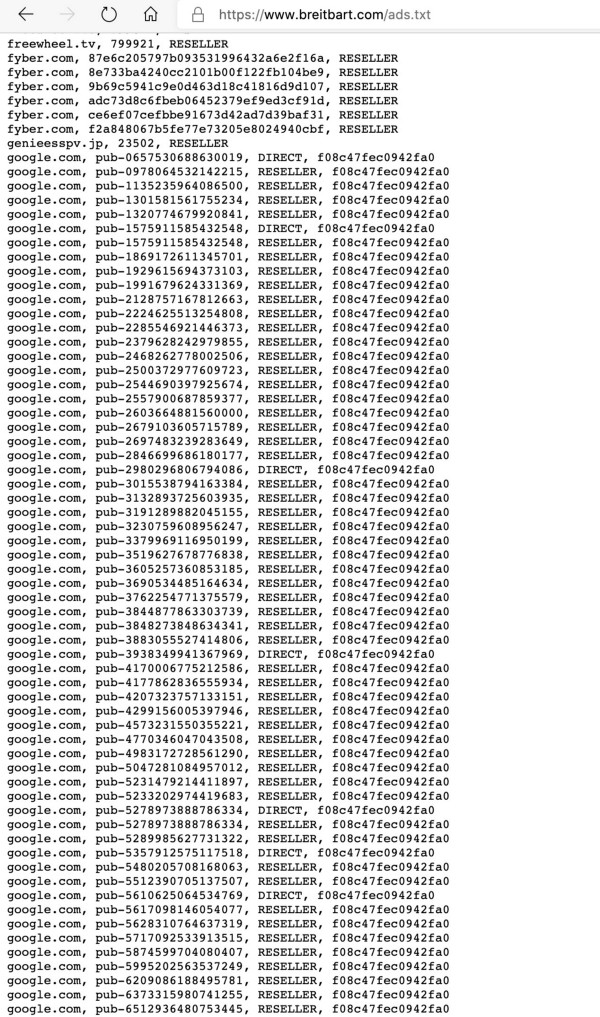
addroplet.com, 142, DIRECT
appnexus.com, 11273, DIRECT, f5ab79cb980f11d1
appnexus.com, 3936, DIRECT, f5ab79cb980f11d1
brightcom.com, 24535, DIRECT
facebook.com, 1243316582352556, DIRECT
facebook.com, 605216793016672, DIRECT
google.com, pub-9229289037503472, DIRECT, f08c47fec0942fa0
google.com, pub-9375184944747545, DIRECT, f08c47fec0942fa0
infolinks.com, 3192217, DIRECT
nextmillennium.io, 6010, DIRECT, 65bd090fa4a1e3d6
pixfuture.com, 3128, DIRECT
revcontent.com, 80018, DIRECT
revcontent.com, 80163, DIRECT
synacor.com, 82063, DIRECT, e108f11b2cdf7d5b
zedo.com, 1792, DIRECT
zedo.com, 1793, DIRECT
To make matters worse, out of that list above, if you are still purposefully trying to buy ads on Breitbart.com, several of the exchanges listed above have significantly more records in the Breitbart ads.txt file and some of those records are part of Dark Pool Sales Houses — so you will need to be able to exclude certain account-bidding IDs for each advertising exchange, or otherwise you will need to exclude the full exchange to ensure you don’t end up bidding on some account-bidding ID for a specific exchange that is actually part of a RESELLER or Dark Pool Sales House inventory.
So the “final list” of ~safe account-bidding IDs that have no records on that exchange in the Breitbart ads.txt record that are being mislabeled in any way, becomes:
addroplet.com, 142, DIRECT
facebook.com, 1243316582352556, DIRECT
facebook.com, 605216793016672, DIRECT
nextmillennium.io, 6010, DIRECT, 65bd090fa4a1e3d6
zedo.com, 1792, DIRECT
zedo.com, 1793, DIRECT
If I were helping someone purposefully target ads on Breitbart.com (ugh), there are only 6 account-bidding IDs that can currently be safely used on an exchange bidding platform without ID-level filters.
Some notes on the 6 “clean” DIRECT records (from 4 unique companies) out of 1,112 total records on Breitbart.com/ads.txt:
- It’s odd that Facebook is on this list, but Facebook also has slightly more strict policies with shared accounts so it’s possible that Facebook is a known “Not Safe for Sales Houses Advertising Network.”
- Addroplet.com is seemingly new/small, so their policies are unclear.
- NextMillennium.io seems to pride itself on quality and is possibly a “Not Safe for Sales Houses Advertising Network” although they do seem to have some mislabeled DIRECT inventory with records like “nextmillennium.io, 5534, DIRECT, 65bd090fa4a1e3d6” showing up on Adweek.com, Gothamist.com, TalkingPointsmemo.com, and several other sites.
- Zedo.com is also possibly a “Not Safe for Sales Houses Advertising Network” — one of their investors is the legendary Esther Dyson, who guides countless ethical technology and society projects.
For almost all advertising exchange companies listed here, it’s unclear what their Dark Pool Sales House policies are. Some probably explicitly ban shared Dark Pool Sales House accounts and ads.txt labels, whereas others may just not address it or police it when the DIRECT labels are misused.
If any organizations listed in this research wants to provide clarity or additional details on their policies, I’ll update sections as-needed with the new information and note the changes.
As it stands today, if you really wanted to buy ads on Breitbart, as much as I can discourage that practice, there are only 4 companies that I would argue can guarantee some semblance of “quality” due to Breitbart’s mislabeling of DIRECT inventory across countless advertising exchanges.
Breitbart doesn’t label their Dark Pool Sales Houses — but RT.com does!
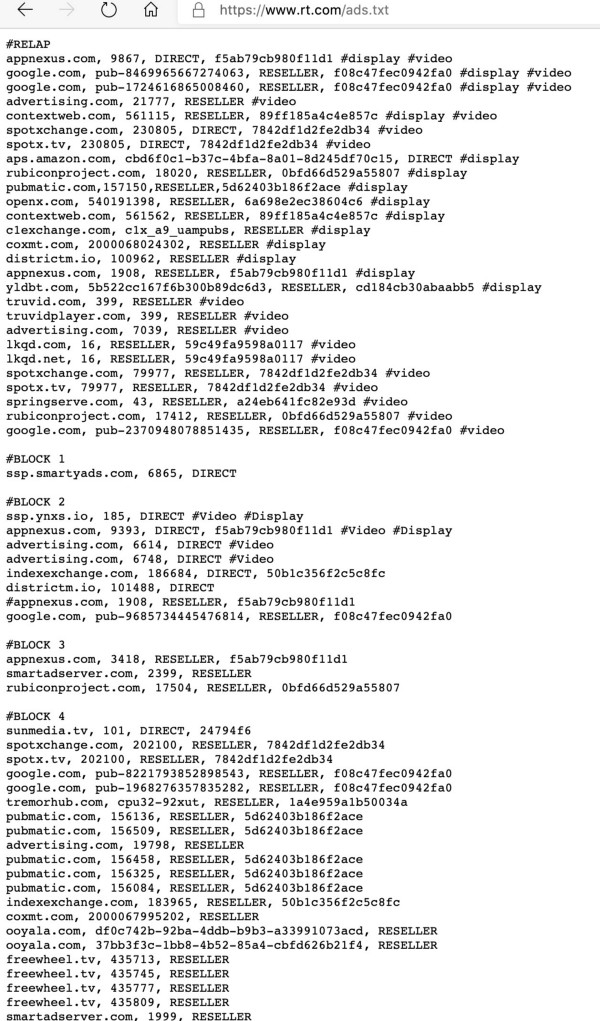
The ads.txt standards don’t specifically require labeling Sales Houses because the “RESELLER” label was supposed to take care of that. But due to organizations like Breitbart and RT.com mislabeling their RESELLER inventory as DIRECT, and other operational imperatives with resellers, some organizations have taken to organizing their ads.txt file in Sales Houses with literal company names/URls who are providing the service.
RT.com does this Sales House labeling with a coded “#Block 1, 2, 3” reference. There are 13 Blocks/Sales Houses in the RT ads.txt file, along with several other sections that appear to be unique Sales Houses.
Some publishers do similar labeling to RT.com, and some even indicate the date that a Sales House was added to the files. There are no official standards for this Sales House labeling and most ads.txt parsers would likely ignore these details or be unable to ingest and parse the notes at-scale.
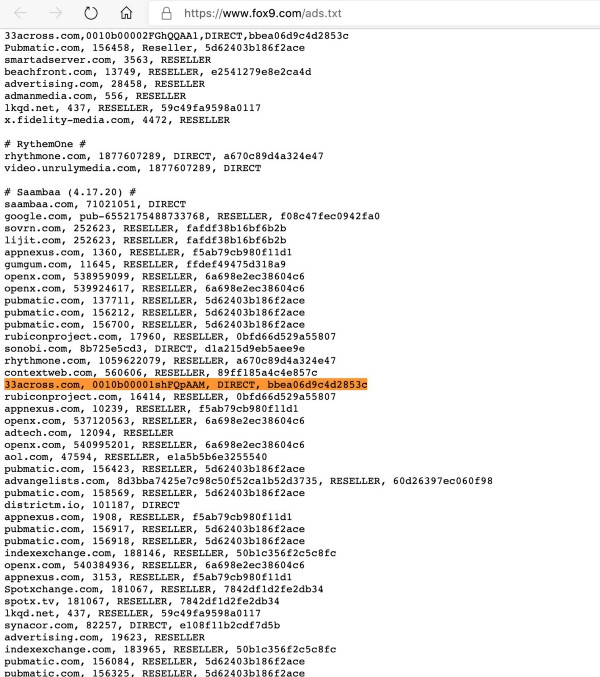
Many companies are helping publishers create Dark Pool Sales Houses…or looking the other way as it happens…
As mentioned throughout this research, huge portions of the Breitbart DIRECT inventory is currently mislabeled, and is actually RESELLER inventory and/or part of a Dark Pool Sales House. Here’s how this works…
Here’s what a account-bidding ID from Breitbart.com/ads.txt looks like:
33across.com, 0010b00001shFQpAAM, DIRECT, bbea06d9c4d2853c
This record can be broken down into parts:
Advertising Exchange: 33across.com
AccountID: 0010b00001shFQpAAM
Type of Inventory Being Alleged: DIRECT
Anti-Fraud Tag: bbea06d9c4d2853c
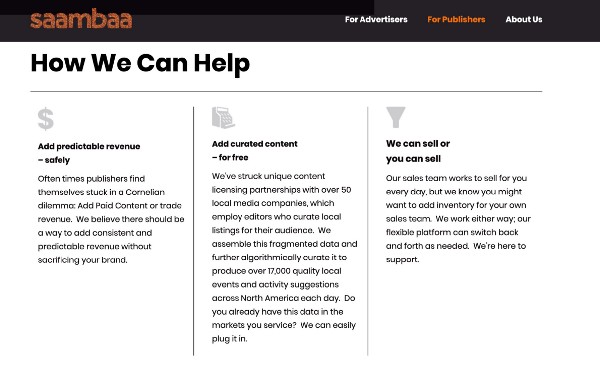
This exact account-bidding ID, including with the “DIRECT” label, can be found on at least 34 websites. This is mislabeled advertising inventory.
And thanks to some sites organizing and labeling their Sales Houses, including Fox9.com, we can assume this account-bidding IDs is part of a Dark Pool Sales House facilitated by a company called Saambaa.
Saambaa CEO Matt Voigt reached out after publication to provide additional context to their work, stating:
“Specifically on the ads.txt Direct issue: We run an events discovery module which renders itself on the page as a Javescript widget. The module is our own content and own experience, which is why we represent the inventory as our own inventory. We do not manage inventory for publishers, or run any kind of publisher ad network.
We don’t work with Breitbart, but since any publisher can copy and paste our ads.txt up, we don’t control what they have up. It’s an unfortunate reality of ads.txt that there is no control of it for us. The Breitbart ad inventory is managed by a third party ad management company. We work with them on other sites and they have grouped our ads.txt as part of their larger assembly of ad buyers on Breitbart.” — Matt Voigt, Saambaa.com CEO
For it’s credit, Saamba is pretty clear about what services they provide, and many organizations who currently facilitate Dark Pool Sales Houses through mislabeled DIRECT inventory, use language about publisher networks and predictable revenue that are valid products. Most of these publisher services should be fine when the shared inventory is labeled as RESELLER inventory, but it becomes a problem when this shared inventory is being labeled as DIRECT.
At least some of the Saambaa clients mislabel DIRECT inventory, including Breitbart.com https://go.saambaa.com/for-publishers/
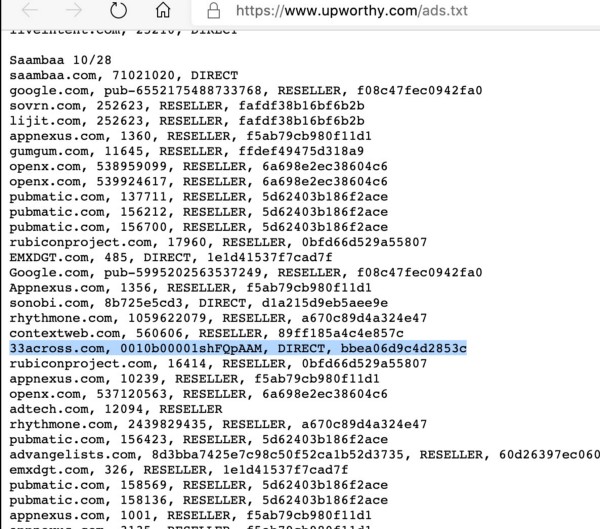
By reviewing just a few of the 34 websites that share this DIRECT label, including Upworthy.com, it’s relatively easy to confirm that this shared DIRECT ID is definitely part of the Saambaa Sales House…
The screen shot to the left is from Upworthy’s ads.txt file — they are among the websites who indicate the Sales House names, as well as the date they were added into their ads.txt records. So we can assume that this Saambaa inventory that overlaps with Breitbart was added on “10/28″, which is likely October 28th, 2019 based on the known timing of deployments as ads.txt has ramped up.
Here are 34 websites that share DIRECT ID’s with Breitbart
There are many other websites, but these are just a few!
Through the Saambaa Dark Pool Sales House, there are 34 websites (including Breitbart)) sharing just one of the Breitbart account-bidding IDs in their ads.txt records. Many of these websites will come as a surprise. But other domains are clearly part of an overlapping network with Breitbart — certain websites show up in Sales House after Sales House with Breitbart, and a pattern emerges that seems to show certain conservative, Republican, and far-right websites are coordinating to deceive advertising buyers by mislabeling their RESELLER inventory as DIRECT.
Here are the 34 sites sharing one mislabeled DIRECT account-bidding IDs:
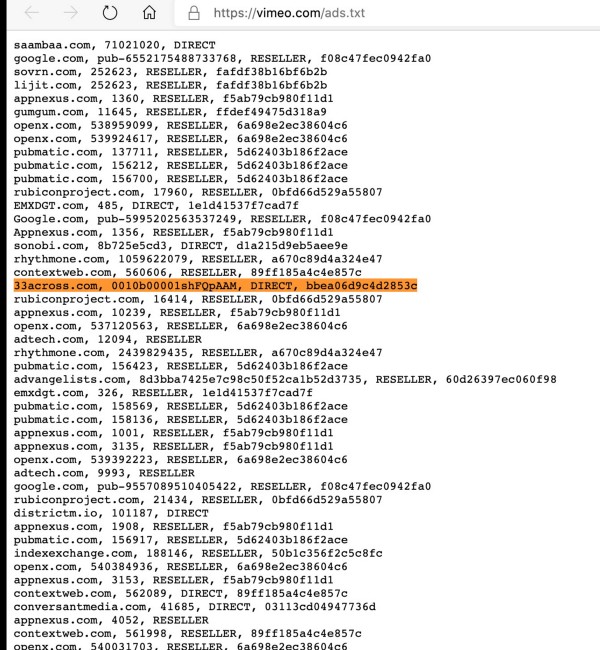
Breitbart.com
DrudgeReport.com
fox9.com
ReviewJournal.com
DallasNews.com
Upworthy.com
UtahRealEstate.com
Vimeo.com
CavsNation.com
Stocktwits.com
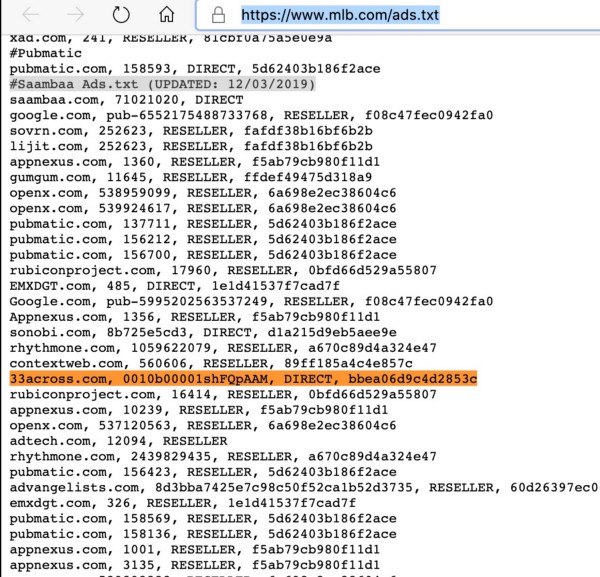
BusinessPress.Vegas
ClutchPoints.com
adn.com
Weatherbug.com
LeetTemplates.com
WowHead.com
InForum.com
Champion.gg
ChicagoReader.com
YachtWorld.com
HighSchoolLot.com
mlb.com
mother.ly
Allmusic.com
Good.is
Hotdeals.com
RefDesk.com
Rap-Up.com
PlymouthHerald.co.uk
BirminghamMail.co.uk
Liverpoolecho.co.uk
Mirror.co.uk
Examiner.co.uk
Publir.com (via the Publisher @ https://a.publir.com/ads-txt/9/ads.txt)
Publir.com is a company associated with a few of the Breitbart Dark Pool Sales Houses so it deserves a brief mention. The company describes itself as a business who helps “optimize revenues in the programmatic advertising market” — they provide several other services as well.
Some of the Publir publishers host their ads.txt file on the Publir domain, and some are part of Dark Pool Sales Houses with Breitbart. In this instance, many of the publications involved in the Sales House are listed on the Publir website, and they include The Federalist, PJ Media, Real Clear Politics and many other names familiar to U.S. politics readers — but you’ll also find other odd and low quality websites mixed into many of these Dark Pool Sales Houses, a tactic which raises questions about potentially unique ad fraud schemes.
Here’s one interesting and massive ads.txt record from Publir to explore (this record and additional ads.txt files will potentially be covered in future research) @ https://a.publir.com/ads-txt/9/ads.txt
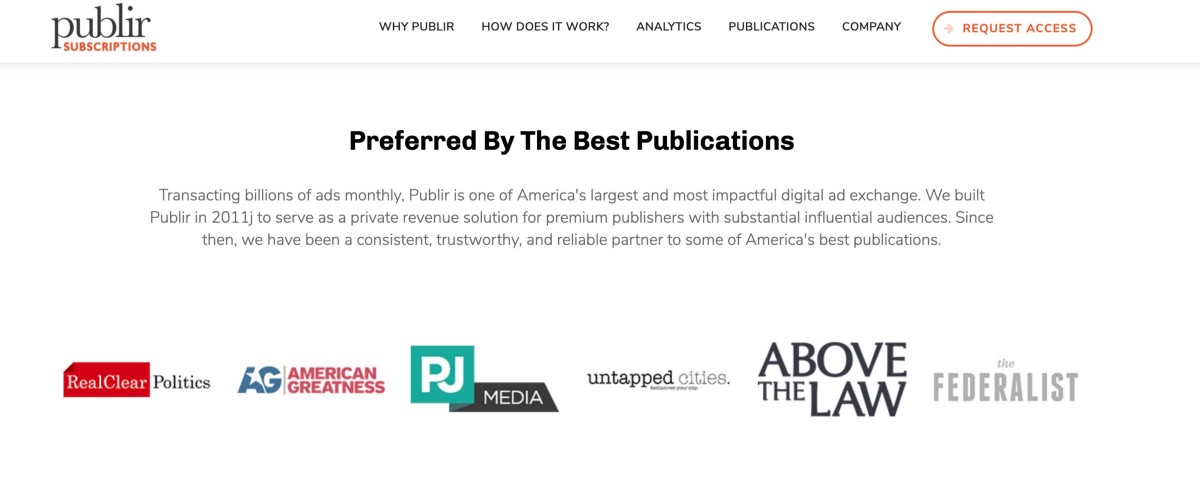
Dark Pool Sales Houses need more scrutiny from the advertising industry and regulatory oversight
Many of the Breitbart.com Dark Pool Sales Houses are labeled on ads.txt files hosted on other websites — so the names of the companies can be found, parsed and flagged. Some of these organizations are violating ethical standards, industry protocols endorsed by the IAB and Google, and likely legal frameworks in numerous jurisdictions, particularly due to their work as data amalgamators without registering as data brokers.
Mislabeled advertising inventory is very similar to mislabeled securities. If a buyer doesn’t know what they are buying, that’s a buyer risk. But if the buyer is being told that an asset is of an asset category of greater value than the asset they are actually acquiring, there is an important line being crossed when the seller is purposefully mislabeling that asset, and coordinating with multiple other businesses to mislabel the assets.
Some of the Breitbart.com ads.txt records mislabeling their DIRECT inventory are found on just a few websites, and aren’t clearly labeled. Some of the mislabeled DIRECT inventory is found on hundreds of websites, with wildly different quality standards and audience profiles across the sites. And some of the mislabeled DIRECT inventory raises concerns about potential ad fraud or inauthentic coordinated activity — or at least significant questions about revenue sharing agreements and cross-publisher agreements that should be disclosed through proper RESELLER inventory labels.
The ads.txt record “appnexus.com, 1899, DIRECT, f5ab79cb980f11d1” for instance, is found on Breitbart.com, but also found on 3 other domains including:
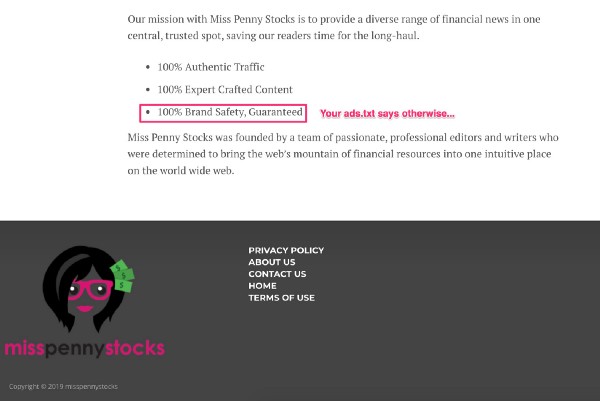
- Breitbart.com
- MissPennyStocks.com
- Tribunnews.com (Indonesian publisher, Subsidiary of https://www.kgmedia.id/)
The ads.txt record “avantisvideo.com, 7729, DIRECT” is another found on Breitbart.com, but also found on several other domains, creating a Dark Pool Sales House of mislabeled DIRECT inventory.
The websites associated with this account-bidding ID are:
- Breitbart.com
- Takimag.com (Screen shot of columnists below)
- RicksFreeAutoRepairAdvice.com (This site has a huge amount of ads, with lots of high paying video ads and multimedia ads . They also host their ads.txt with the Conservative Publisher Dark Pool Sales House at Publir.com
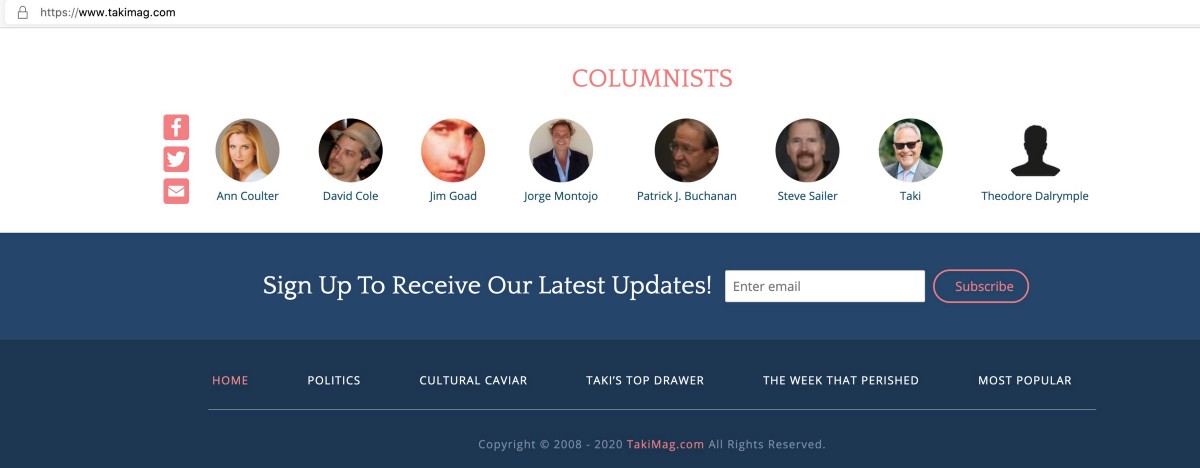
As mentioned throughout this research, there are a huge number of account-bidding IDs being mislabeled as DIRECT on Breitbart.com, and there could be dozens of interesting Dark Pool Sales Houses that are created, or potential low quality spam sites within the networks. We strongly encourage anyone involved in online buying or looking to navigate the complex world of online advertising Dark Pool Sales Houses, to start searching the Breitbart account-bidding IDs labeled as DIRECT, literally searching the full records in quotes on Google, and you’ll find most or all of the websites and direct links to those ads.txt records to confirm.
Conclusion and Next Steps
Ads.txt is only three years old, but instead of reducing ad fraud, it has created whole new vectors of mislabeled inventory being abused by Dark Pool Sales Houses and facilitated, or ignored, by advertising companies across the world.
When ads.txt was first debated, the IAB and other advertising organizations knew that a Sales House would exist — which is why the entire concept of a RESELLER label was created. There is nothing wrong with a properly labeled RESELLER account-bidding ID for a Sales House within an ads.txt record — entire sectors of the advertising industry are structured to provide this type of audience amalgamation service.
But an important line is crossed when account-bidding IDs are labeled as DIRECT and cloned across multiple websites owned by different companies. This does not align with the intent of this label as defined by the original standards, nor does it align with how the label is used by legitimate publishers. This mislabeling is by many standards a form of advertising fraud — and it’s a breach of trust for buyers who are trying to navigate the new and complex ads.txt advertising standard.
In the near future, advertising exchanges should strongly clarify their policies around Dark Pool Sales Houses — that is — mislabeled DIRECT inventory across multiple websites owned by different companies. And hopefully, buyers who participated and won auctions from these IDs, should get refunds on the lower quality inventory they potentially received.
There are still many important discussions to have around Dark Pool Sales Houses, and potentially new legislation that should be crafted to articulate rules and regulations for these markets. There is likely some additional research that will be released on this topic, and hopefully some updates from advertising exchanges who clarify their policies.
Online Advertising Brand Problems Require Businesses to “Check Your Ads” — and Why Co-Founders Nandini Jammi and Claire Atkin Understand Brand Risk in the Online Ads Space in the Era of Fake News, Disinformation, and Hate Speech
This research is being published in collaboration with Nandini Jammi and Claire Atkin, co-founders of Check My Ads (https://www.checkmyads.org/) and publishers of the must-subscribe newsletter BRANDED.
Their work is a one stop shop for all breaking news in brand safety, online advertising changes and how to effectively navigate the complicated world of online ads and fake news. Their new company Check My Ads gets an extremely strong (unpaid) endorsement from me — and anyone buying online ads in any significant amount/frequency needs to strongly consider reaching out to them to understand their process and products.
Nandini Jammi is also the co-founder of Sleeping Giants, which until this past month I had no clue was a title that was in any form of dispute, particularly some horrific dispute from the white man who co-founded the organization with her. If you haven’t read her important story, please take the time to read “I’m leaving Sleeping Giants, but not because I want to”
This open letter from Nandini was published while we were working on this ads.txt research, and it was an unfortunate reminder that activists can’t ignore problematic peers, and we must ask the tough questions when we see women and POC being sidelined or not properly given the exposure for their work. Personally, I know I can always do better here, and I think every white man should be regularly assessing their behavior and conduct to elevate any peers that aren’t getting their proper credit.
Briefly about Sleeping Giants and the relationship to this research… from my perspective, I had read the 2018 NYTimes article and had engaged with the group back in 2016, and I always thought there were 2 co-founders — which there obviously are.
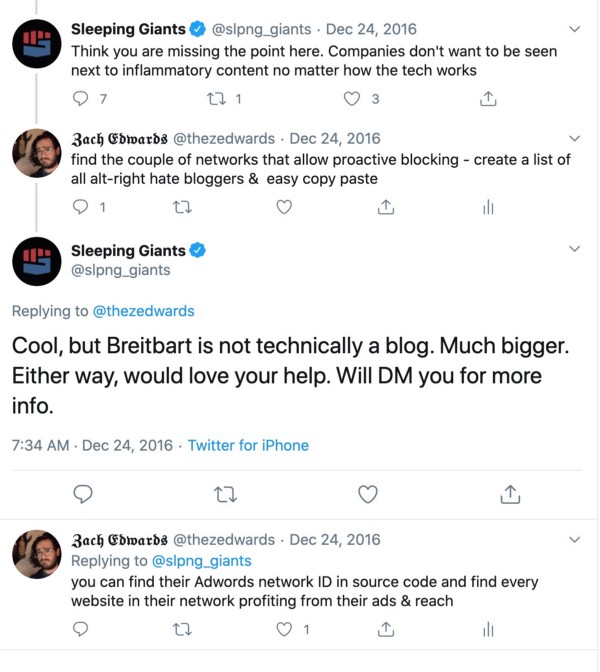
But back in 2016, I was skeptical of the Sleeping Giants strategy (I was wrong), but also encouraged them via Twitter to parse the advertising network ID available in the source code of websites to find more of the networks associated with Breitbart. SG never reached out to me and I dropped the issue, but this concept has been in the back of my head for a few years (and used by me to analyze tons of other networks) — and during that time, ads.txt launched and became the core way for sharing account-bidding IDs across businesses.
In June of this year, after having connected with Claire earlier in the Spring and seeing their BRANDED newsletter start to tackle important online advertising and brand safety topics (and rack up wins!), I reached out directly to Nandini to talk about this account-bidding ID-mapping concept I first raised in 2016. I had seen some of Nandini and Claire’s recent brand protection wins, and one of their tweets reminded me of the idea again to parse account-bidding IDs to map Breitbart partnerships. We started talking and this research is the result.
While some of the research here into the specific ads.txt Sales Houses, and some of the technical / market conclusions here are my personal opinion/analysis, this research wouldn’t be possible with the work of Nandini and Claire, and I’m confident that they will both prove anyone wrong who doubts or discounts their power to change how brands and advertisers approach online ads.
The three of us spoke throughout the research and their insights into buying practices, brand safety strategies, and their understanding of risk mitigation in online buying is at the top of the game, and a real inspiration for data supply chain researchers like myself.

Personally, I’ve worked with some of the biggest and best digital ad buyers in the world, and there are less than half a dozen that I would trust with friends/family/client budgets and optimization strategies. Nandini and Claire have my strongest recommendation, and can’t wait to see their careers continue to shape the world and internet we live and conduct business in.
Nandini and Claire have also published a detailed summary and action guide in their newsletter about this Ads.txt research —you should click here and open their work in another tab and read it right now.
Please don’t hesitate to ping any of us on Twitter (@nandoodles, @catthekin, @thezedwards) with any questions or concerns.

Recent Comments